Sound: 









Value: 









(Read about our ratings)
I don’t know what it is, but once the weather gets cold and there’s sunlight for 30 minutes a day, I crave some warm colors and a cozy glow. Tube amps, in other words. You might be thinking, “But, Geoff, you live in Los Angeles. Surely there’s no winter?” And I would say, “Winter is a state of mind, friend.” While the irony of complaining about winter from Southern California while writing for an outlet based in Ottawa, Canada, is not lost on me, I would like to say that I had to put on a sweatshirt to go outside today, and that is unacceptable.
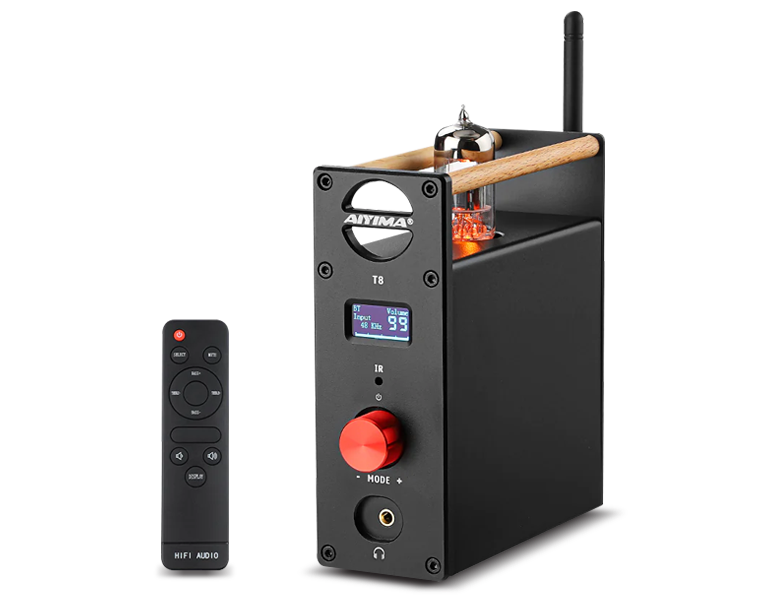
Where was I? Oh, right. Tube amps. If you’ve already read my February 1 column, you’ll know I’m on the hunt for some decent headphone amps. I have a few in the queue, but I wanted to start with the Aiyima T8 because it sells well on Amazon, costs $120 (all prices USD), and probably sells more than amps from more audiophile brands. It’s got a USB DAC, an interesting vertical design, and a single 6N3 tube. It also has some line-level RCA outputs if you want to connect to some powered speakers.
A few years ago I did a roundup for Sound & Vision after a similar late-night Amazon tube hunt. Those amps were less than impressive. I wasn’t expecting much out of the T8 given my history with the category, but it’s actually (spoiler!) not bad.
In the box
The small 6N3 tube comes uninstalled. Installing it is just a matter of lining up the pins. Depending on which site you visit to purchase the T8, you have a choice of power adapters. There’s also a Bluetooth antenna and a remote.
Use
It’s easy enough to screw in the Bluetooth antenna and slot in the tube. My Windows 10 PC recognized it as soon as I connected it via USB. The red knob controls the volume, but pressing it switches inputs. Holding the button down turns the T8 on and off. The screen on the front has big numbers for the volume, as well as a bar along the bottom that shows it as a percentage of “maximum.” It also tells you the sampling rate of the incoming signal.
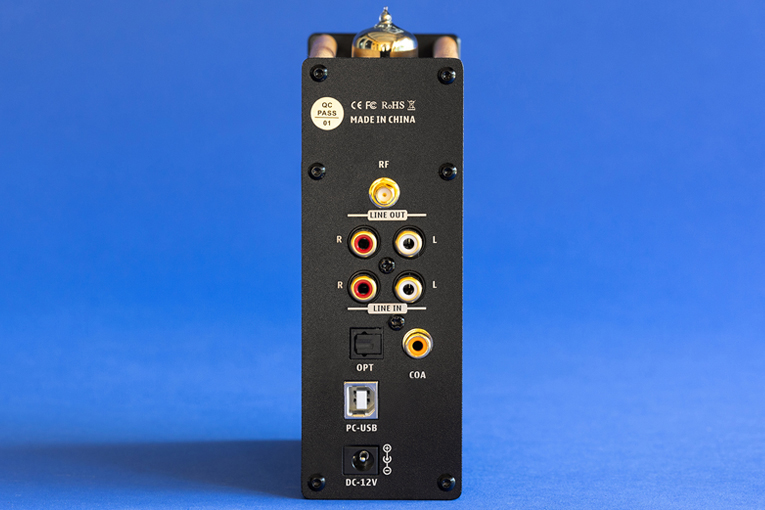
The remote doesn’t come with batteries. I guess that’s asking a lot for $120. With it you can turn off the screen, adjust bass and treble, cycle through inputs, and of course, adjust volume.
Shockingly, the tube is actually functional. While the T8 will work if you remove the tube, it has significantly less power. When I turned it all the way up without the tube installed, it was still well below normal listening volume.
Sound
I tried a few different headphones with the T8 to see how it’d fare. One mild impediment to this was the headphone jack: 1/8″ (3.5mm) instead of the larger 1/4″ (6.5mm) found on many high-end headphones. Not a huge issue, of course, just something to keep in mind if you’re considering the T8.
I started with the Audeze LCD-3 headphones, an older model, but a favorite of mine and definitely not easy to drive. Overall, the T8 was able to power them well, though I’ve certainly heard the LCD-3s sound a little tighter. I was able to get them to play quite loud, however, which is certainly the most important thing with a headphone amp, regardless of price.
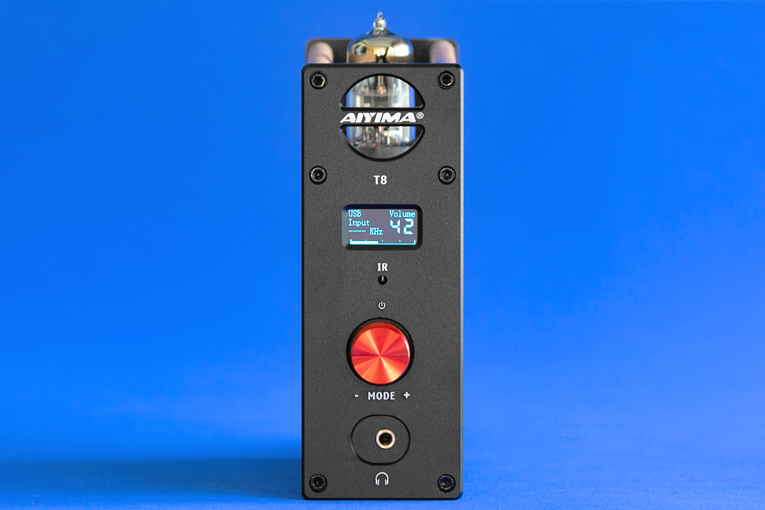
Next, I plugged in HiFiMan’s Sundara open-back headphones (review in the queue, Brent Butterworth reviewed the closed-back version). With Caroline Polachek’s “Welcome To My Island” (Desire, I Want to Turn Into You, 24-bit/44.1 kHz FLAC, Perpetual Novice / Quboz), the Sundaras sounded quite open, with controlled bass. I used this indie/experimental pop track, with its strong beat and soaring vocals to test the volume potential of the T8. A setting of 60 was plenty for most listening, 80 being quite loud. Above 80 it started to break up a bit, with some mild distortion as the level increased.
I didn’t want to just test open-backed headphones, so next up I tried the Meze Audio Rai Penta earphones. These aren’t very hard to drive, but they’re quite neutral and I was curious if the T8 was adding in anything untoward to the audio. With the jazz/rock of “Polifemo” from Matteo Mancuso’s The Journey (24/44.1 FLAC, The Players Club / Qobuz), the guitar, piano, and drums all had excellent attack. However, there was some noticeable, though quiet, hiss. Could this be a result of the tube? That seems like a distinct possibility. It was enough to hear between tracks, or in pauses in the music, but not enough to be a distraction.
Comparison
I stuck with the LCD-3s for this section, as they were the hardest to drive of the headphones I tested with the T8 (I also listened through some additional models not listed above). To give us the “bad” end of our frame of reference, I compared the T8 to the headphone jack on my desktop PC. Can a computer’s headphone output even power a pair of LCD-3s? Technically, yes. I was certainly able to get music. At a level of—and I’m not kidding—100, the LCD-3s were approaching what I’d call “loud.” The bass was sloppier and more compressed than it should have been with these headphones. A comparable subjective volume on the T8 was around 70. The bass was also fuller and tighter on the T8.
Up next was the Sony NW-A306 portable media player. While I generally like the A306, it’s not known for having a very powerful amp. In fact, rather the opposite. In terms of volume, it did better than the headphone jack on the computer. No heavy lift there, to be fair. At maximum, the LCD-3s were slightly above normal listening volume. So in this case, the T8 was far more powerful. Overall sound quality was good, though, and I don’t think many people are planning on walking around with huge planar-magnetic headphones and a portable media player. Still, a point in the T8’s favor for sure.
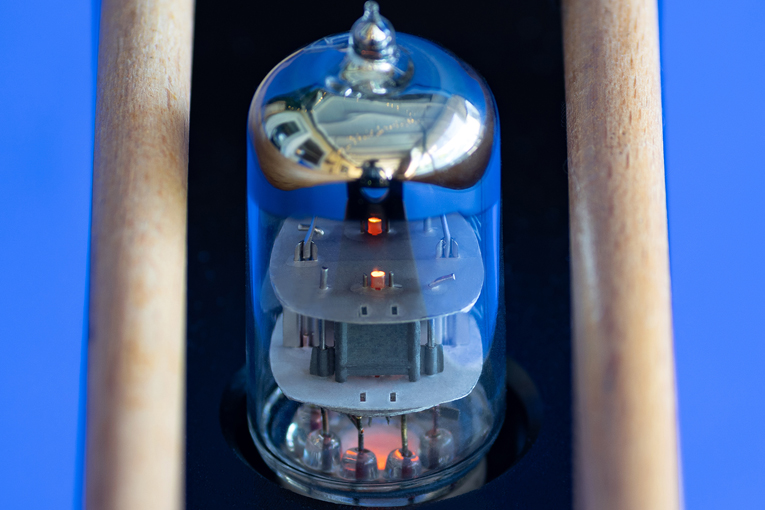
Lastly, some more serious competition: the iFi Audio Hip-dac2 that I use in many of my reviews (Brent reviewed the original). Not surprisingly, the Hip-dac2 easily pushed the LCD-3s not only far louder than the T8 could, but did so far more cleanly and with stronger, tighter bass. At $189, the Hip-dac2 is more expensive than the T8. While the Hip-dac2 definitely sounds better, it doesn’t look as cool. The small-flask aesthetic isn’t bad, but the orange glow from the T8’s single tube (albeit lit mostly from an LED), is more visually interesting.
I’ve got several other headphone amps in the queue to review, and I’ll be comparing the T8 to those as well in the near future.
Conclusion
Any review inevitably leads to the question “Is it worth buying?” I’ll equivocate a bit and say “maybe.” I like how the T8 looks. The red volume knob, bright display, and “glowing” tube are all interesting. I think the display would work better with the overall design if it were orange like the tube instead of cyan. That’s not a dealbreaker though. It all works, and it lacks the obvious issues that products in this price range can have. It’s not as powerful as a dedicated headphone amp/DAC, and it has a bit of hiss that’s audible during pauses in the music. But for something small and cool on your desk, the T8 looks neat and works decently. Random audio gear purchased blindly on Amazon could have just as easily ended up a molten lump on the cinders of what was my desk.
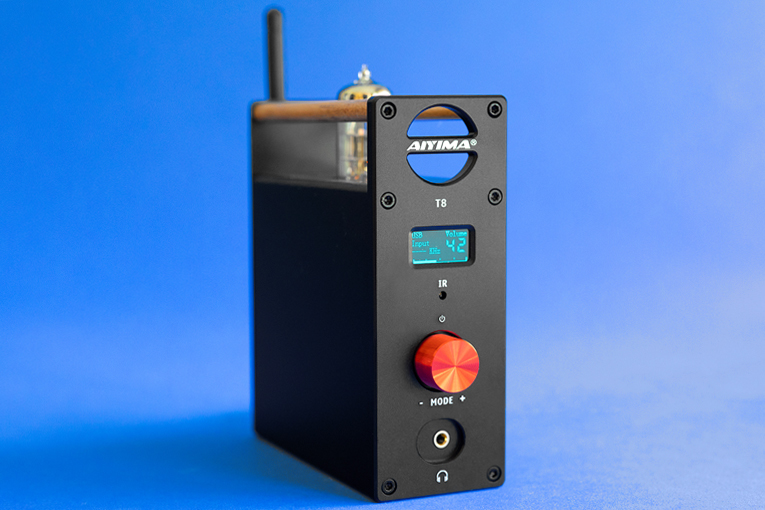
Will it replace a real headphone amp? Not really. In terms of sound quality, an iFi Hip-dac2 is a bit more money, and beyond that you can get things like a Schitt (review coming soon), HiFiMan (ditto), and so on. So to me, this would make a great addition to an office where you don’t want to use the headphone jack on your computer, and you want something that looks interesting, but you can’t justify spending more. Within those specifics, the T8 is a great option.
. . . Geoffrey Morrison
Associated Equipment
- PC: iBuyPower Windows 10.
- Headphones: Audeze LCD-3, HiFiMan Sundara.
- Earphones: Meze Audio Rai Penta.
- Portable media player: Sony NW-A306.
- Headphone amplifier: iFi Audio Hip-dac2.
Aiyima T8 headphone amplifier-DAC
Price: $120.
Warranty: One month.
Aiyima
4F, Building 7 Hekan industrial park.
Wuhe south road 41.
Long-Gang district.
Shenzhen. China. 518000
Email:
Website: www.aiyima.com




